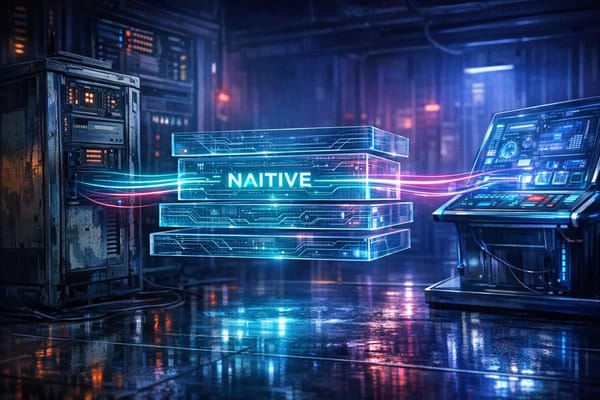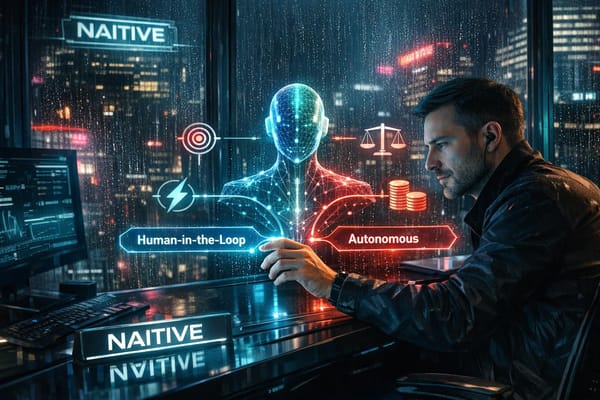Top Tools for Generative AI Knowledge Base Creation
Explore how generative AI tools are revolutionizing knowledge base creation and management, enhancing efficiency and personalization.

Generative AI is transforming how businesses create and manage knowledge bases. It automates content creation, updates outdated information, personalizes user experiences, and supports multilingual content - all while saving time and improving efficiency. Here’s a quick look at the top tools covered in this article:
- Notion AI: Combines writing assistance, smart search, and integrations with 150+ tools for $10/user/month.
- DeepSeek: Processes large documents with affordable AI capabilities starting at $0.14 per million tokens.
- ChatGPT: Offers conversational AI, real-time insights, and flexible pricing, including a free plan.
- Scribe: Automatically creates step-by-step guides from real-time tasks, saving hours of work.
- NAITIVE AI Consulting: Delivers tailored AI solutions with managed services for businesses of all sizes.
Quick Comparison
| Tool | Key Features | Cost | Best For |
|---|---|---|---|
| Notion AI | Writing assistant, smart search, integrations | $10/user/month | Teams needing collaborative tools |
| DeepSeek | Large document processing, API integration | $0.14/million tokens | Affordable, large-scale document analysis |
| ChatGPT | Conversational AI, real-time insights | Free to custom pricing | General-purpose AI for various tasks |
| Scribe | Step-by-step guide creation | Custom pricing | Visual process documentation |
| NAITIVE AI | Custom AI solutions, managed services | Custom pricing | Tailored solutions for unique workflows |
Key takeaway: Choose a tool based on your organization's needs, budget, and goals. Generative AI tools can save time, improve accuracy, and make knowledge bases more accessible.
How To Build Knowledge Bases Using AI 🧠📄 | ZenoChat | Text Cortex
How Generative AI Changes Knowledge Management
Generative AI is reshaping knowledge management by automating tasks that once required substantial manual effort. Instead of drafting content from scratch, AI pulls from existing data sources to automatically create detailed, well-organized knowledge base materials.
This automation doesn't stop at content creation. AI can also identify and fix errors in documentation, fill in missing details for incomplete articles, and archive outdated information without human intervention. By merging related content, it creates unified resources that break down traditional silos, ensuring employees have access to accurate and up-to-date information.
Personalization is another game-changer. Unlike traditional systems that provide the same content to everyone, generative AI tailors information to meet individual user needs and preferences. This means employees or customers get information that's more relevant to their specific context.
Generative AI also revolutionizes multilingual knowledge bases. It can translate content into multiple languages automatically, eliminating the need for separate translation projects and making information globally accessible.
Another standout feature is document summarization. AI can take lengthy documents - like technical manuals, policies, or research reports - and distill them into concise, easy-to-read summaries. Irfan Shuttari, Director of eDiscovery Strategy at Veritas, highlights this capability:
"Auto summarization…can be particularly valuable for digesting large volumes of text or understanding the key points of complex documents without needing to read through the entire content."
The search experience has also taken a leap forward. Instead of simply matching keywords, AI now understands the intent behind queries. Julie Mohr, Principal Analyst at Forrester Research, explains:
"It's not surfacing a bunch of knowledge articles and saying, 'Here are a bunch of responses that might work.' It searches in those and says, 'Oh, here's the answer to the question … And oh, by the way, here's the link to where we found that information.'"
Generative AI also boosts problem-solving efficiency. By analyzing patterns in data, it can generate targeted knowledge articles for recurring issues. For example, if service desk agents notice similar problems appearing across tickets, AI can create resolution guides to address them, cutting response times and ensuring consistency.
Governance and compliance processes see significant improvements, too. AI can scan content for sensitive information, verify compliance with regulations, and flag potential issues before publication. This not only speeds up approval workflows but also ensures high security and regulatory standards.
Another impressive feature is AI's ability to transform raw data into polished articles. Whether it's bullet points from a service desk ticket, fragments from various sources, or basic data, AI can turn these into comprehensive, structured content. It essentially turns every interaction into a valuable piece of knowledge.
With 56% of IT workers reporting higher helpdesk ticket volumes and 78% attributing this increase to hybrid work setups, automated knowledge creation allows organizations to scale their support operations without needing to expand their teams proportionally.
1. Notion AI
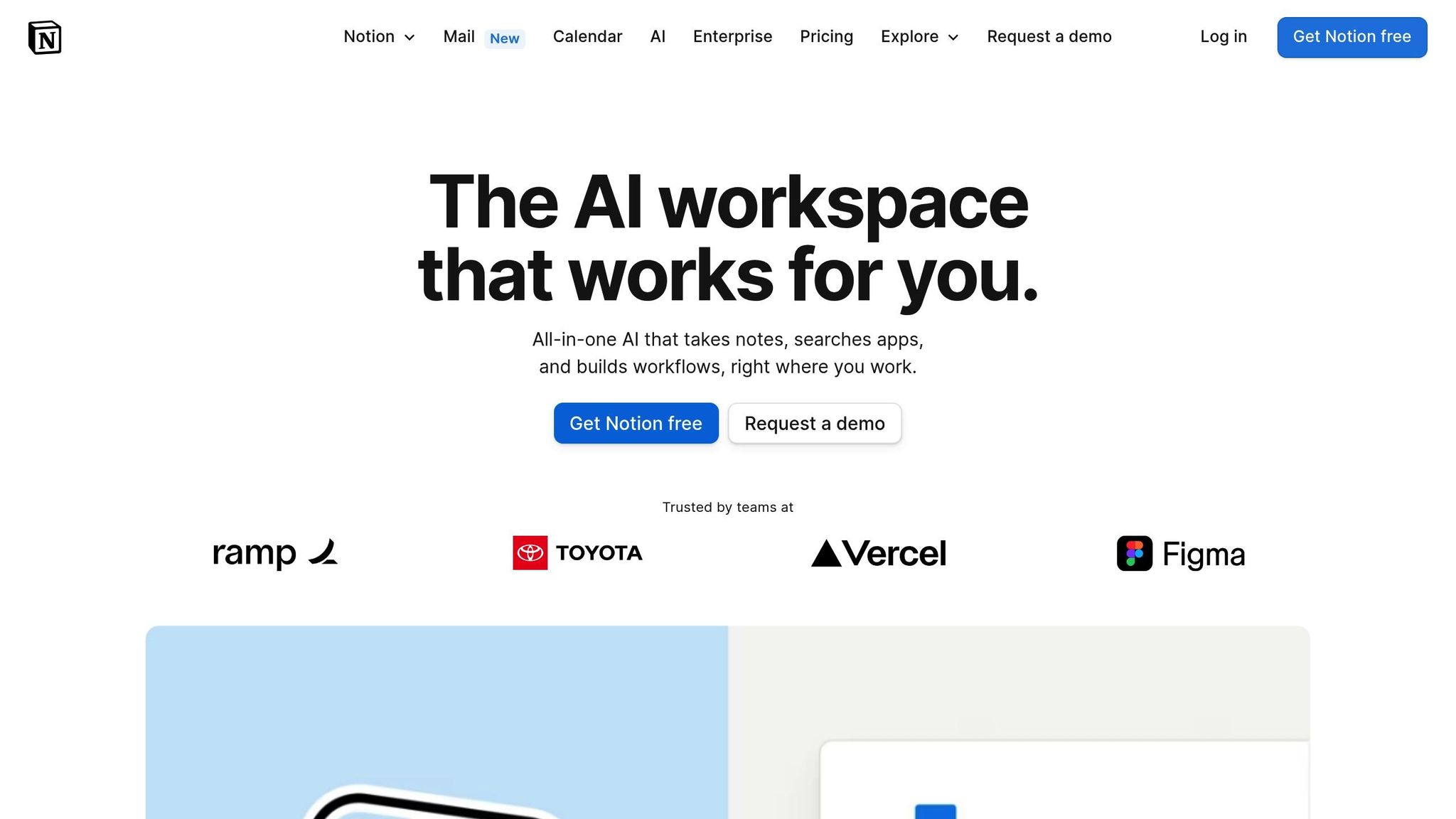
Notion AI brings a fresh approach to knowledge base creation by combining an AI chatbot, a writing assistant, and a smart search engine. Built on advanced models like GPT-4 and Claude, it helps teams locate information, generate content, and make sense of data all in one place.
AI-powered Knowledge Generation Capabilities
Notion AI takes the heavy lifting out of content creation by automating tasks that would typically consume hours. It can summarize lengthy documents, highlight key points, brainstorm ideas, draft content, fix grammar and spelling, and even translate text into various languages. With simple commands like /summarize, /action items, and /custom AI block, it simplifies building and maintaining a knowledge base.
On top of that, Notion AI can quickly create structured databases from basic descriptions, tailoring them to fit your specific needs.
Integration with Existing Systems
Notion AI connects seamlessly with over 150 business tools, including Jira, Google Drive, Slack, Figma, and GitHub . This integration eliminates the need to manually transfer information, allowing teams to pull data directly from these platforms.
Its webhook functionality takes automation a step further by triggering actions in real time as events occur in connected systems. For example, Sarah Chen, a Technical Project Manager, shared how this feature transformed their workflow:
"The Jira connector eliminated our daily standup bottlenecks by giving developers and product managers a single source of truth."
Notion AI also works with scheduling apps and other tools to streamline processes across the organization, making it easier to manage tasks and deadlines.
Customization Options for Organizational Needs
Notion AI is designed to adapt to your organization's specific preferences and requirements. You can instruct the AI to follow your style guide for consistent content creation.
It also allows users to create content based on existing templates. For instance, you can say, "Create a meeting notes doc inspired by this one '@' <insert name of doc>" to generate a new document. When setting up databases, providing detailed descriptions helps the AI produce tailored properties and views, which can be fine-tuned until they meet your exact needs.
These customization features ensure the platform aligns with your team's dynamic workflows.
Cost-effectiveness for Businesses
Notion AI is available as an add-on to existing plans, priced at $10 per user per month - or $8 per user per month with annual billing. It offers a suite of AI-driven tools that minimize manual tasks and enhance productivity, making it a smart investment for businesses .
2. DeepSeek
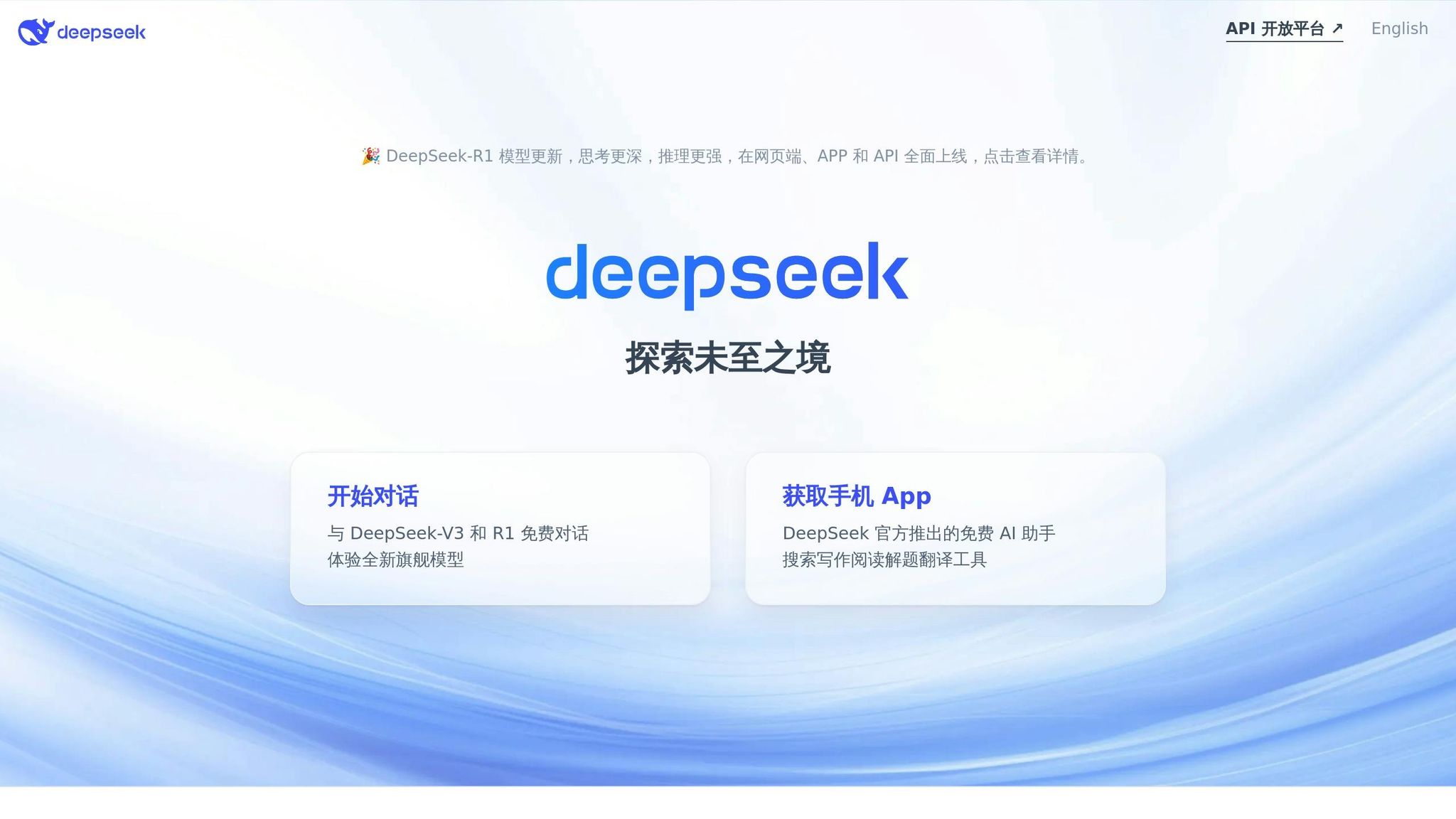
DeepSeek is an AI solution designed to deliver top-tier performance without the hefty price tag. With training costs around $6 million, it drastically undercuts the budgets of hundreds of millions typically required by other enterprise AI systems. This affordability opens the door for businesses of all sizes to harness advanced AI for knowledge management. Its capabilities make it a versatile tool across various industries.
AI-Powered Knowledge Generation
DeepSeek handles complex documents with ease, processing up to 128,000 tokens at a time. This means organizations can efficiently analyze lengthy reports, technical manuals, and extensive knowledge bases without losing context or accuracy.
The platform's real-world impact is impressive. For example, a consulting firm achieved a 28x ROI in just six months, a major bank cut its audit process time by 90%, and a law firm reduced M&A contract review from three weeks to two days. These results translate into saved hours, improved compliance, and fewer errors - 15 hours of repetitive work saved weekly for the consulting firm, error reduction by 50% for the law firm, and streamlined processes for the bank.
Seamless Integration with Existing Systems
DeepSeek’s API makes it easy to integrate AI search and intelligent data recovery into current business systems. It works with CRMs, ERPs, cloud platforms, and custom applications, ensuring smooth adoption into existing infrastructure.
Take Zilliz DeepSearcher as an example. This Python-based tool pairs DeepSeek with vector database capabilities like Milvus, enabling secure, semantic searches across unstructured datasets, such as PDFs or internal documents. By converting data into vector embeddings, it supports Q&A systems while safeguarding sensitive information.
Another example is RAGFlow, an open-source Retrieval-Augmented Generation engine. It leverages DeepSeek to break documents into chunks, generate embeddings, and store them in vector databases. When queried, RAGFlow retrieves the most relevant segments, providing detailed answers with citations. It even supports PDFs, images, and tables with layout analysis.
Tailored Solutions for Unique Needs
DeepSeek doesn’t stop at integration - it offers extensive customization options to meet specific organizational demands. Through parameter tuning, custom dataset training, and API integration, businesses can adapt the platform to their unique workflows. Developers can fine-tune models with industry-specific data using transfer learning, and organizations can configure data sources, ranking algorithms, and user interfaces to suit their needs.
With pre-training across data from 18 major industries, DeepSeek is ready to handle a wide range of business scenarios right out of the box. Deployment options include on-premise setups, cost-efficient AI processing, and advanced Chinese NLP capabilities, catering to regional and security-specific requirements.
Affordable for All Businesses
DeepSeek’s pricing structure ensures that advanced AI capabilities are within reach for organizations of any size. The API costs $0.14 per million input tokens and $0.28 per million output tokens, offering substantial savings compared to traditional enterprise AI solutions.
The platform’s value is evident across industries. A retail company used it to handle over 5,000 daily customer queries, freeing up human agents for complex cases and improving customer satisfaction by 40%. A manufacturing plant saved $2 million annually by cutting unplanned downtime by 35% through equipment monitoring. Even smaller businesses see results - a drone e-commerce seller achieved a 90% resolution rate with an AI-guided diagnostic tool, while another e-commerce company optimized inventory management to avoid $1.2 million in lost sales.
3. ChatGPT
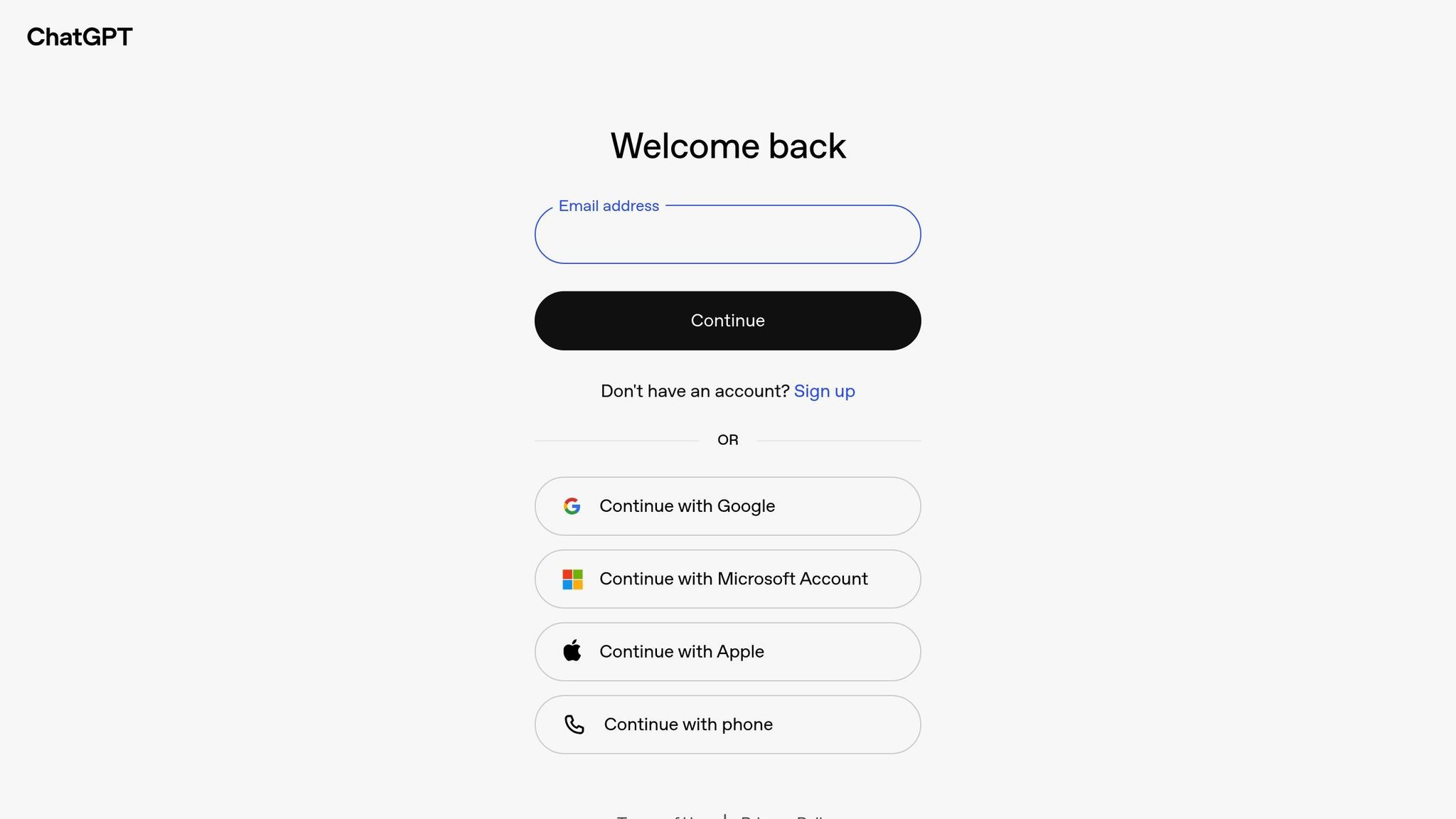
ChatGPT is making waves in the world of AI-powered knowledge management, offering a practical and flexible tool for creating and maintaining knowledge bases. With 49% of businesses already using ChatGPT and another 30% planning to adopt it, it’s clear this platform has become a go-to choice for organizations aiming to revolutionize their approach to managing information.
AI-Powered Knowledge Generation Capabilities
ChatGPT stands out for its ability to automate documentation and generate detailed reports that deliver real-time insights. By rethinking how organizations build and update their knowledge bases, it helps simplify workflows and speed up decision-making.
One of its standout features is its ability to process and analyze large datasets, generate actionable insights, and provide tailored recommendations. Acting as a conversational interface, ChatGPT allows users to interact more naturally with knowledge bases. It can interpret questions, understand context, and suggest specific articles or resources.
What’s more, ChatGPT learns from user interactions, identifying common questions and pinpointing areas where the knowledge base could improve. This ongoing learning ensures that the system remains relevant and effective as organizational needs evolve.
The platform also personalizes the experience by understanding individual preferences and learning patterns. It can customize training materials and even overcome language barriers with real-time translation, making it a seamless addition to existing workflows.
Integration with Existing Systems
ChatGPT's ability to integrate with existing systems makes it an attractive option for businesses with established processes. It can connect through chatbots or APIs and works with platforms like Microsoft Teams, ensuring a smooth transition with minimal disruption.
For instance, Microsoft has incorporated AI into its Azure cognitive search knowledge base, enabling users to navigate sections or search for information quickly and efficiently. In customer support, ChatGPT shines by providing fast and accurate responses, helping agents with relevant articles, answers, or suggestions. This reduces response times and improves the overall quality of service.
Customization Options for Specific Organizational Needs
ChatGPT’s flexibility allows it to adapt to the unique requirements of any organization. Businesses can train the model with their own data, enabling it to handle industry-specific queries and understand specialized terminology or processes.
With ChatGPT Enterprise, customization goes even further. Organizations can securely integrate their own data and connect the model to existing applications, ensuring the AI is tailored to their workflows. Importantly, these custom models remain exclusive to the organization, addressing concerns around data security and confidentiality.
Thanks to its multilingual capabilities, ChatGPT is particularly helpful for global businesses. Its ability to generate content in multiple languages makes it a valuable resource for companies aiming to support diverse audiences.
"We believe AI can assist and elevate every aspect of our working lives and make teams more creative and productive. Today marks another step towards an AI assistant for work that helps with any task, is customized for your organization, and that protects your company data." - OpenAI
Cost-Effectiveness for Businesses
ChatGPT’s pricing structure is designed to accommodate organizations of all sizes. Options include a Free Version ($0), a Plus Version ($20 per person/month), and an Enterprise Version (custom pricing), allowing businesses to choose the plan that best fits their needs.
The platform also delivers measurable results. For example, it has been shown to boost customer satisfaction by 20% while cutting costs. By automating knowledge base article creation with techniques like few-shot learning, ChatGPT significantly reduces the time and resources needed for content development.
Its ability to handle multiple tasks - ranging from content generation to user support - makes ChatGPT a comprehensive solution for businesses looking to modernize their knowledge management systems without requiring massive infrastructure changes.
4. Scribe
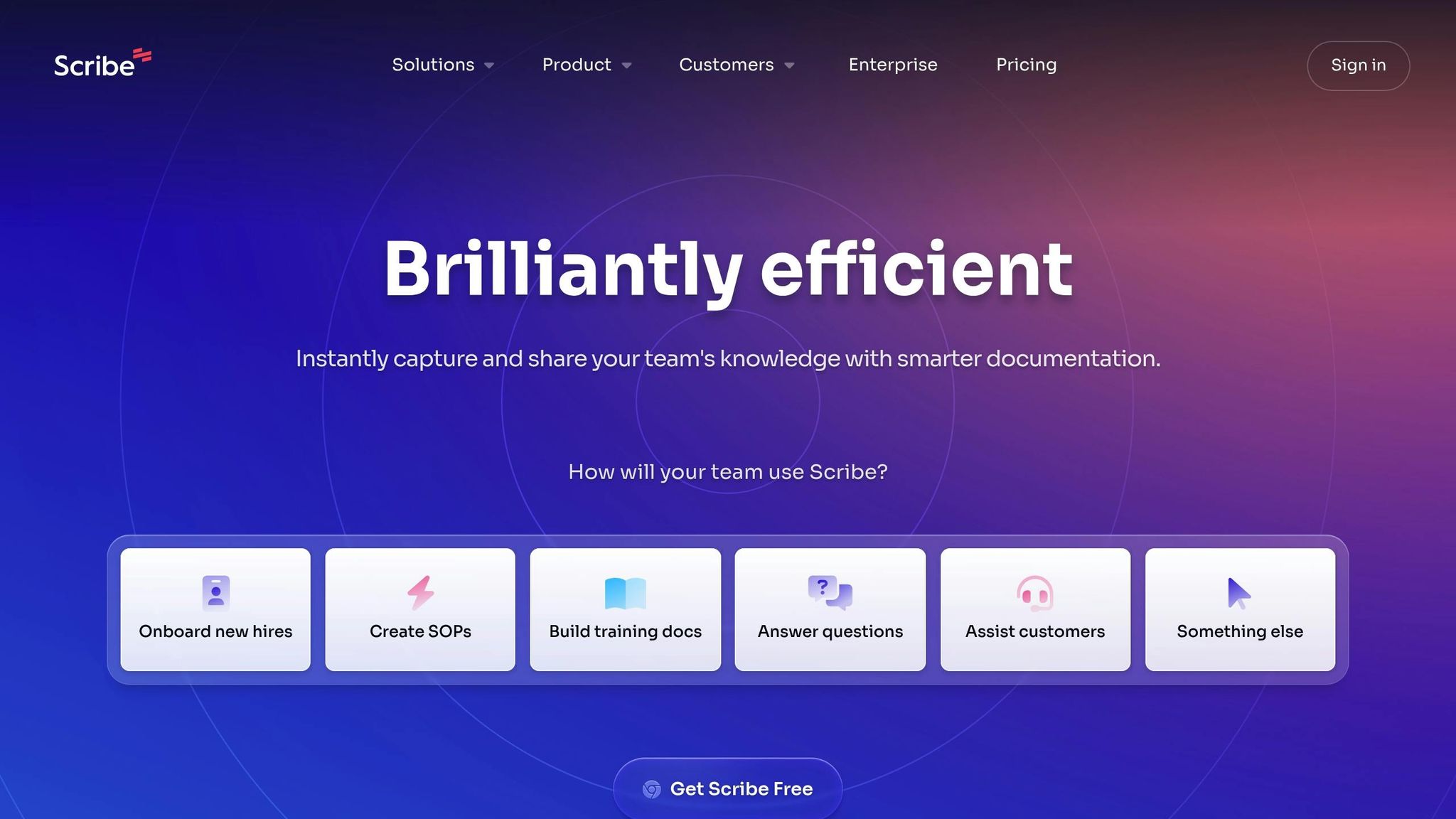
Scribe transforms the way knowledge bases are created by automatically capturing processes in real time and turning them into detailed, visual step-by-step guides. Instead of relying on traditional methods like manually taking screenshots and writing lengthy instructions, Scribe simplifies the process using AI to capture both images and text as tasks are performed.
AI-Powered Knowledge Generation
Scribe’s AI doesn’t just record what’s on your screen - it takes things further by auto-generating titles, descriptions, and contextual details. It even redacts sensitive information automatically. With just one click, users get a polished guide, complete with annotated visuals and text. Plus, it’s flexible - users can easily add their own tips or make edits to tailor the content. This level of automation saves a lot of time. In fact, Scribe can help organizations save over 20 hours every month. Emily Kilgore, Director of Learning & Development, shares her experience:
"Scribe easily shaves half the time off of guide development for me and my colleagues. The best money I've spent at this company."
Integration with Existing Systems
Scribe works seamlessly with popular tools like Zendesk, Notion, Confluence, and SharePoint through API integration. It also offers features like organization-wide libraries, usage analytics, and flexible export options, making it easy to incorporate into existing workflows.
Customization for Organizational Needs
The platform is designed to adapt to various organizational requirements. Users can customize layouts, merge multiple guides into comprehensive documents using Scribe Pages, and collaborate in real time. These features make it a versatile tool for teams looking to streamline their knowledge management processes.
Saving Time, Securing Data
As Eitan Revel, Director of Global Account Management, explains:
"Before Scribe, I designed user manuals via PowerPoint. It could take days for a single guide. After switching to Scribe, everything became much easier and faster."
Beyond its time-saving benefits, Scribe also prioritizes data security. It ensures that user data is never used to train third-party models, thanks to strict controls on how its AI providers handle information. This commitment to security reassures organizations that their data remains protected.
5. NAITIVE AI Consulting Agency
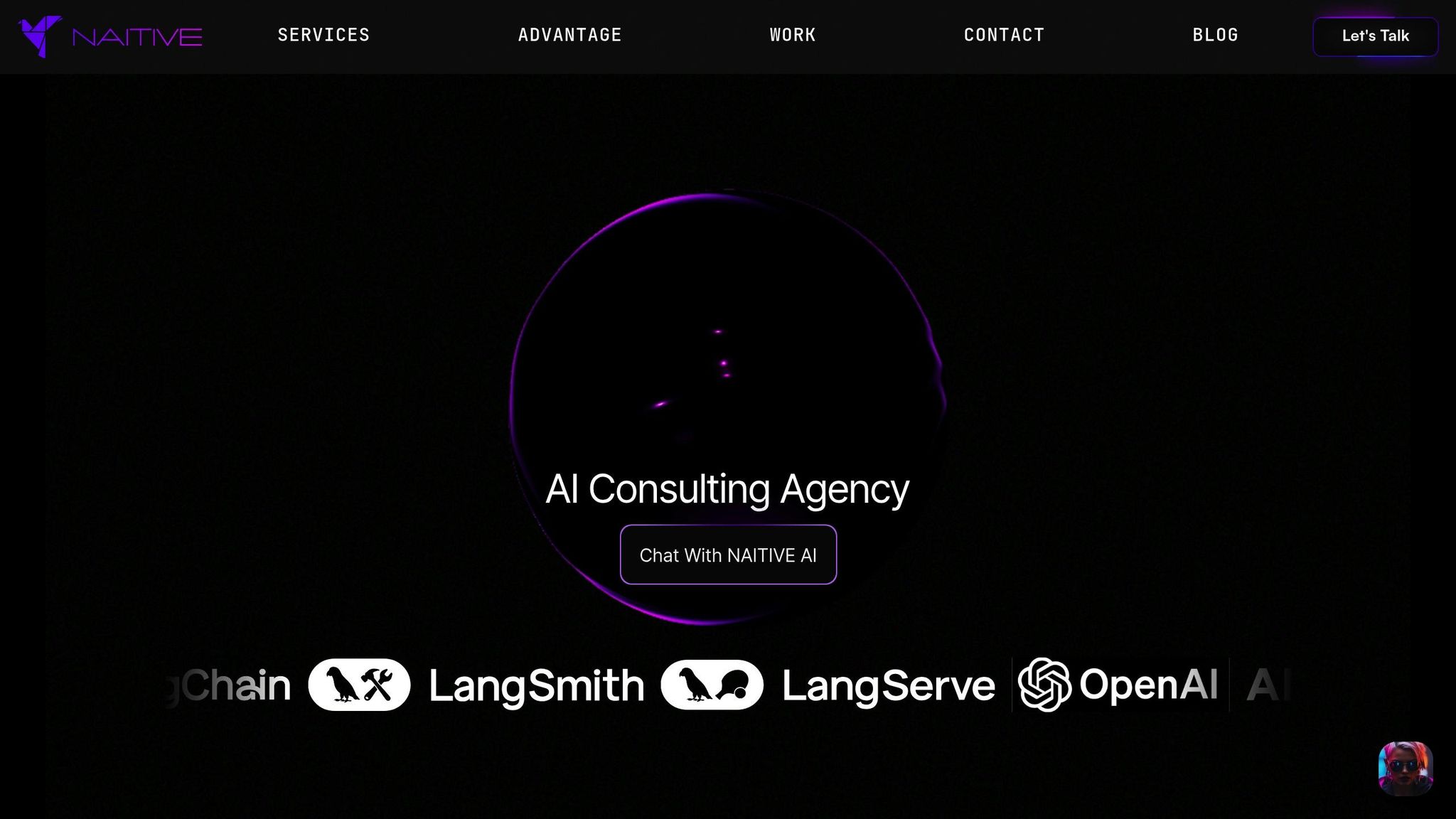
NAITIVE AI Consulting Agency goes beyond the basics of chatbot technology to deliver advanced generative AI solutions. While many providers stick to standard chatbot features, NAITIVE develops fully autonomous AI systems right from the start. These systems are designed to simplify and enhance knowledge management processes. Below, we’ll explore NAITIVE's expertise in AI-driven knowledge generation, seamless system integration, tailored solutions, and budget-friendly managed services.
AI-Powered Knowledge Generation Capabilities
NAITIVE uses autonomous agents, referred to as "Employee as a Service", to tackle tasks like data analysis, solving complex challenges, and keeping knowledge bases up to date. These AI agents don't just organize existing information - they actively contribute to a dynamic, ever-evolving knowledge base, making it easier for organizations to generate and manage valuable insights.
Integration with Existing Systems
One of NAITIVE's strengths lies in its ability to integrate AI solutions into your current setup. Their consulting process begins by assessing your infrastructure to find the best integration points. Whether you’re working with older systems or modern cloud environments, NAITIVE ensures their solutions fit seamlessly - supporting everything from low-code platforms to large-scale cloud solutions.
Customization Options for Specific Organizational Needs
NAITIVE takes the time to understand your unique business operations and challenges. They identify areas where AI automation can significantly improve knowledge management and then craft solutions tailored to your goals. Whether it’s a straightforward low-code implementation or a more advanced integration, NAITIVE collaborates with you to create a proposal that directly addresses your organization’s needs and objectives.
Cost-Effectiveness for Businesses
For companies looking to maximize value, NAITIVE provides AI as a Managed Service. This approach eliminates the need for building and maintaining an internal AI team, offering a more affordable alternative. With AI investments delivering an average return of 3.5X - and some businesses seeing returns as high as 8X - NAITIVE helps you harness these benefits without the added overhead. Their emphasis on measurable outcomes ensures that every dollar spent enhances how your organization creates, organizes, and accesses knowledge.
How to Choose the Right Tool
Picking the right generative AI tool can make or break your success. With 45% of IT leaders ranking AI as their top budget priority for 2025, the stakes are high.
Focus on the problem, not the tool. As Prasad Ramakrishnan, CIO at Freshworks, advises:
"It always starts with defining your problem statement and then looking at by reviewing available tools."
This mindset helps you avoid getting distracted by flashy features that don’t address your actual needs. The right tool should align with your specific operational challenges.
Budget Considerations and ROI Planning
Budget is a key factor when choosing a tool, especially as IT executives forecast GenAI budgets to more than double from $3.45 million in 2025 to $7.45 million in 2026. Costs can vary widely based on your approach.
Building an in-house solution is expensive. A small AI team can cost over $400,000 annually, and high-performance GPUs run about $10,000 per unit. Cloud solutions, on the other hand, range from $1 to $24 per hour.
Managed services or cloud-based platforms often provide better value. For example, OpenAI’s GPT-4 Turbo charges $0.01 per 1,000 input tokens and $0.03 per 1,000 output tokens. Lee Moore, VP of Google Cloud Consulting, emphasizes the importance of measurable results:
"I would be asking my team to come back to me with a plan to deliver a certain percentage improvement in efficiency and output...with an expectation it would grow beyond that and to give me the budget request to achieve that."
Technical Integration and Compatibility
After determining your budget and ROI goals, ensure the tool integrates smoothly with your existing systems. Evaluate how well it connects to your current data ecosystem and whether it can turn undocumented knowledge into actionable insights .
Good data in, good results out. According to Forrester Research, organizations using AI knowledge bases can cut the time required for knowledge-intensive tasks by up to 50%.
Security, Privacy, and Compliance Requirements
Addressing data security, privacy, and compliance is non-negotiable. Set up an approval process to review and authorize generated outputs before they’re shared publicly.
If you operate in a regulated industry, ensure the tool meets all compliance requirements without sacrificing functionality. Regulatory considerations around data usage and content generation should guide your choice.
Scalability and User Experience Factors
A scalable solution is a must, especially as your knowledge base grows. Look for platforms with an intuitive interface that makes it easy for users to access and explore data.
Stay flexible. Avoid getting locked into a single vendor. As Lee Moore points out:
"You don't want to get locked into any particular model or tool because there are now hundreds if not thousands of them today."
Choose a platform that allows you to adapt as technology evolves.
Implementation Strategy and Change Management
Once you’ve selected a tool, start small. Launch a pilot program and expand as you see results. Engage stakeholders early to build trust and ensure they understand how to use the tool effectively. Monitor usage to confirm it’s being adopted and that features are utilized.
Keep refining the model by retraining it with new data and addressing any issues that arise.
The best tool strikes a balance between functionality, cost, security, and user adoption. By focusing on your unique challenges and following a structured evaluation process, you can choose a solution that revolutionizes how your organization manages and accesses knowledge.
Conclusion
Generative AI is reshaping how organizations build and manage knowledge bases, with Gartner projecting the global market to hit $20 billion by 2025. This technology opens up new ways to automate content creation, tailor user experiences, and improve knowledge management workflows. The key is choosing the right tool to address your specific operational needs.
Start small with a pilot project targeting a particular challenge. As IBM's Caroline Garay emphasizes:
"AI is only as good as the data that informs it, and the need for the right data foundation has never been greater."
With 30% of generative AI projects failing due to a lack of business vision, having clear goals from the outset is crucial. Aligning your strategy with solid data practices and secure systems can pave the way for scalable success.
Data quality is non-negotiable. Your AI tool should have access to accurate, complete, and up-to-date information. Introduce approval processes for AI-generated content and maintain human oversight to catch biases or inaccuracies. When done right, the results are impressive - Forrester Research reports that AI-powered knowledge bases can cut time spent on knowledge-intensive tasks by up to 50%.
Security and compliance must also take center stage. Establish robust data protection policies and ensure all AI-generated outputs go through proper approval channels. This is especially important as 75% of customer experience leaders view AI as a way to enhance human intelligence rather than replace it.
Carefully evaluate each tool based on your budget, integration needs, and scalability. Whether you opt for platforms like Notion AI or work with experts like NAITIVE AI Consulting Agency for tailored solutions, the right choice will depend on your organization’s unique challenges and growth goals.
Select a tool that fits your needs, implement it with a pilot program, and refine your strategy based on real-world results. Secure stakeholder support, focus on continuous improvement, and scale as your operations evolve.
FAQs
How can generative AI tools make managing my organization's knowledge base faster and more accurate?
Generative AI tools are changing the game for organizations managing their knowledge bases. By automating content creation, these tools can produce well-organized articles in no time, ensuring information remains up-to-date and relevant while saving valuable time.
But that’s not all - generative AI also takes search functionality to the next level. By interpreting user intent more effectively, it delivers highly accurate and useful results. This means employees can locate the information they need much faster, boosting productivity and enabling quicker, more informed decision-making. Integrating generative AI into knowledge management systems helps organizations simplify workflows and keep their processes running smoothly.
What should I look for when choosing a generative AI tool that fits my business needs and budget?
When choosing a generative AI tool, it's important to start by looking at the provider's expertise. Opt for a company with a solid history of creating AI solutions that fit your industry. This way, you can be confident the tool is built to tackle the unique challenges your business faces.
You’ll also want to check the tool’s technical compatibility with your current systems. Can it integrate smoothly and meet your data requirements? Don’t forget to think about its scalability - will it adapt as your business grows? Lastly, take a close look at the costs, including both the upfront investment and ongoing maintenance. Make sure it fits your budget while delivering the features and support you need to succeed.
How do generative AI tools ensure data security and compliance in industries with strict regulations?
How Generative AI Supports Data Security and Compliance
Generative AI tools play a crucial role in maintaining data security and meeting compliance standards, especially in industries with strict regulations. These tools excel at analyzing massive datasets to monitor compliance, track regulatory updates, and ensure alignment with frameworks like GDPR or CCPA - all while minimizing the chances of human error. They also simplify reporting processes, saving time and effort for organizations.
When it comes to safeguarding sensitive data, these tools integrate strong security measures such as encryption, secure communication protocols, and routine audits. By focusing on data integrity and blocking unauthorized access, generative AI helps build trust and reliability - qualities that are essential for industries operating under rigorous regulatory demands.

